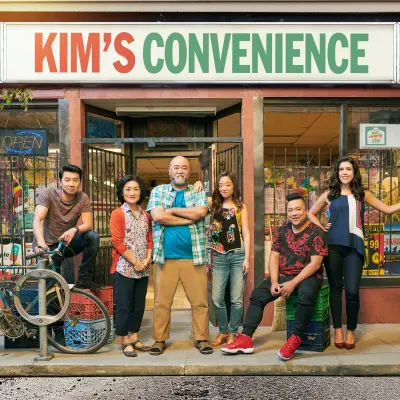When it comes to contending with the white gaze, Kim's Convenience is the past and We Are Lady Parts is the future
-

Kim's Convenience, says Sonia Saraiya, is a "nice" show. "The immigrants are centered, not marginalized. The accents are not there to be laughed at. Everyone cares about everyone else’s feelings," says Saraiya. "As with Ted Lasso, Parks and Recreation, and Schitt’s Creek (also Canadian), the essential kindness is what drew American viewers, especially over the past few years...Kim’s Convenience battles expectations merely by existing; the show has five Asian Canadian leads, and in its diffident way demands the audience witness Toronto’s diversity. But after a while the sweetness sours; all the pulled punches become exhausting. It can be especially difficult to take Kim’s studied buoyancy given that we live in a world where one is just a few clicks away from renting and pressing play on Minari, a story about Korean immigrants in Arkansas that tears away the viewer’s illusions. The aching honesty of the film sheds light on just how hard Kim’s is working to cater to its white audience. The sitcom offers diversity, but the longer I watch, the more I see how Appa and Umma (Jean Yoon) have to be carefully packaged and presented to be comprehensible, not to mention relatable and likable. To be sure, concessions need to be made to meet the viewer where they’re at. But it’s always been odd to me that despite their thick accents, Appa and Umma routinely speak in English to each other, instead of the Korean they’re probably fluent in. They never get the chance to not be immigrants—even to each other." In contrast, We Are Lady Parts doesn't make accommodations for white viewers. "Each character conveys a unique experience of coming of age as a Muslim woman through her hair, head coverings, and preferred music, which ranges from halal to haram," says Saraiya of the Peacock series. "We Are Lady Parts combines the zing of Edgar Wright’s fun-forward films—particularly the amateur band in Scott Pilgrim vs. the World—with the immigrant family heartache and Londoner accents of Bend It Like Beckham. Manzoor’s show offers the audience a ton of range within the narrow category of Muslim women, quadrupling the types of Muslim women you see onscreen in one fell swoop. It’s fascinating too that while the women question their parents, their traditions, and their talent, they never question their faith. Most important, especially in the context of Kim’s Convenience, is that We Are Lady Parts doesn’t shy away from strong feelings. Saira (Sarah Kameela Impey), the bandleader, practically vibrates with anger; by contrast, Amina (Anjana Vasan), the narrator, is saturated with fear, so afraid of being seen that she’s prone to public upchucking. The magnificent Ayesha (Juliette Motamed) oozes with glamorous, badass cool, putting together a look that is so on point that she makes a statement without opening her mouth. The season is swift but so rewarding that I watched it twice, marveling at the concise character beats that reveal the cultural baggage and deeply felt emotion the girls are navigating. After finishing this season, I’m eager to learn more about the characters, and particularly to dig into the sources of their anger and shame, to find the points where their voices might clash with the world’s idea of who they’re supposed to be. But I’m also satisfied, because although they didn’t jettison all of their burdens, they got worked up enough to get really loud about it. Nice has its moments. But sometimes what you want and need and ache for isn’t nice at all." ALSO: We Are Lady Parts creator Nida Manzoor on the development process: "One of the things I realized when I was going into making the show was that I can only speak from my truth and represent the women I know."
TOPICS: Kim's Convenience, Netflix, Peacock, We Are Lady Parts, Nida Manzoor
More Kim's Convenience on Primetimer:- Simu Liu says his Kim's Convenience criticism "never meant to be a massive bombshell exposé, nor was I trying to call anyone out specifically"
- Kim's Convenience's Jean Yoon recalls "overtly racist" storylines, "painful" experiences on show
- Presenting 18 Korean foods that have been featured on Kim's Convenience
- Simu Liu expresses frustration with Kim's Convenience's "overwhelmingly white" producers after abrupt cancelation
